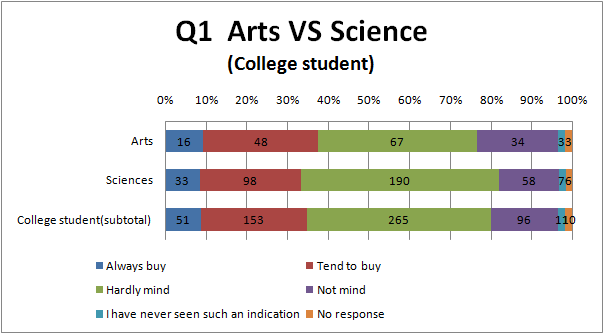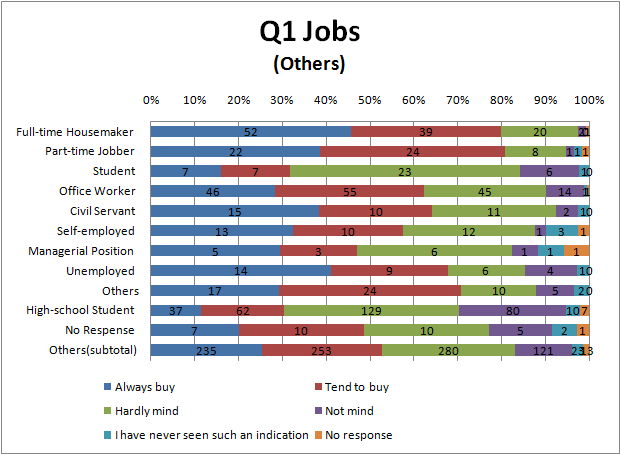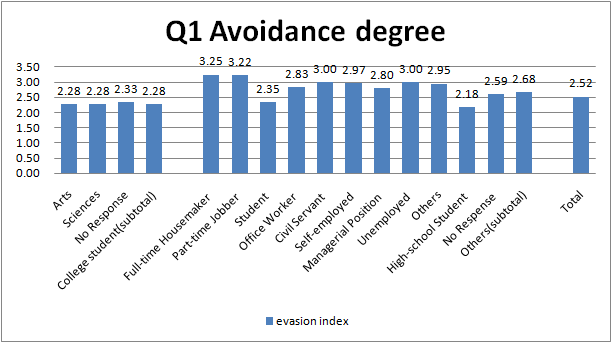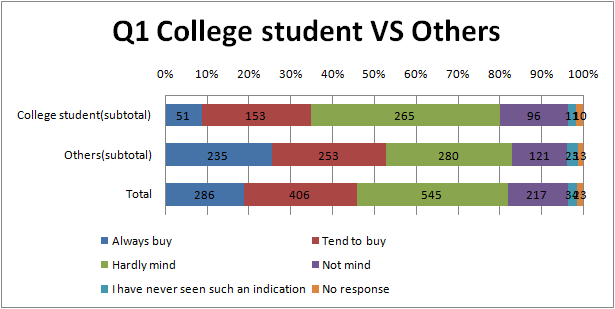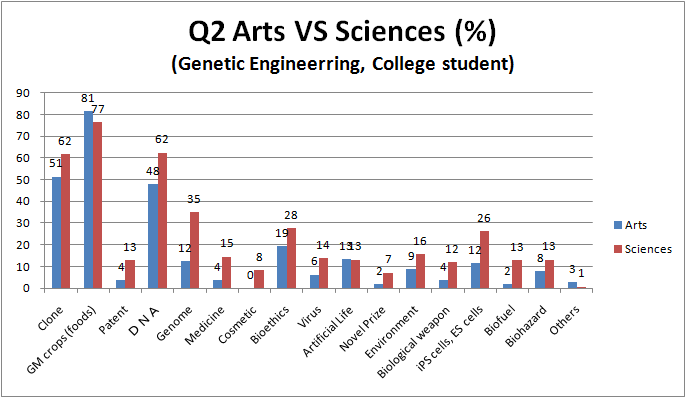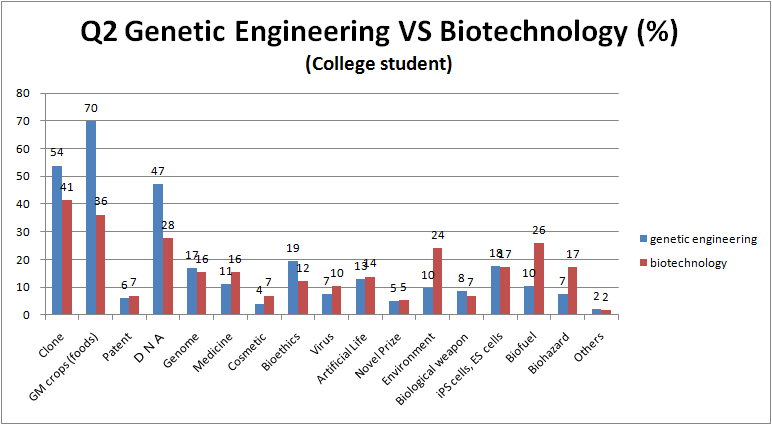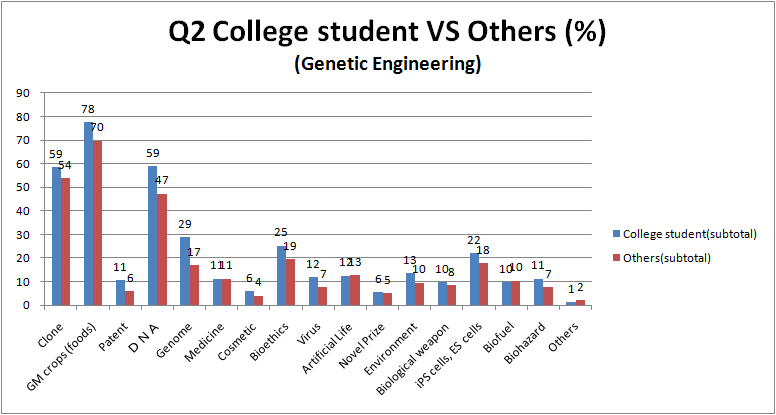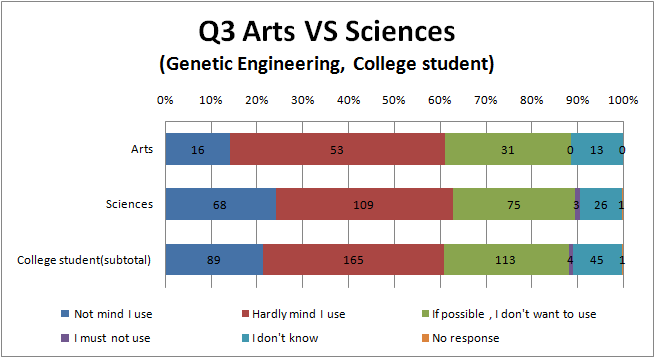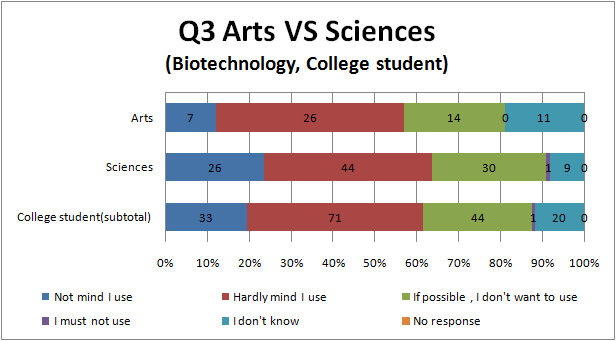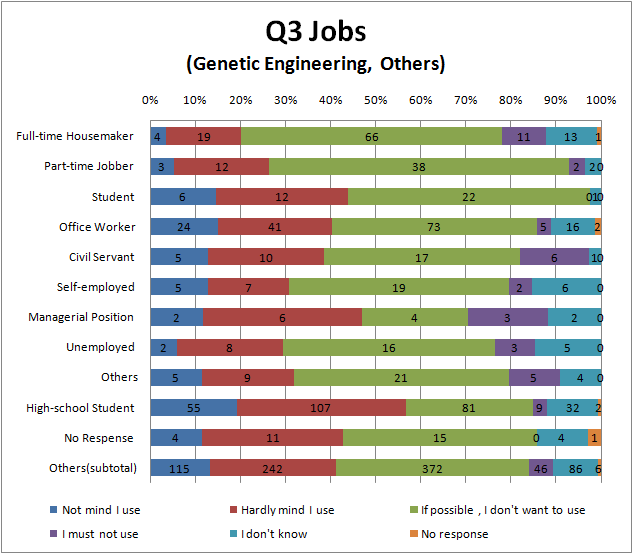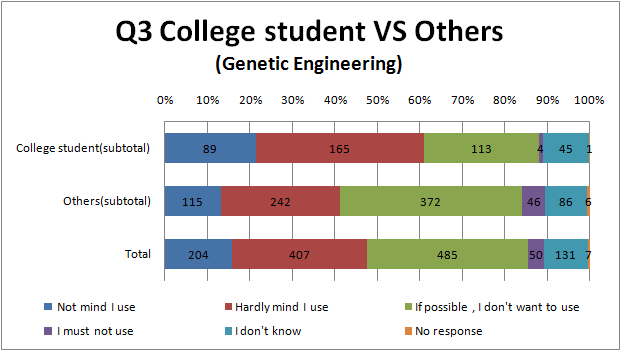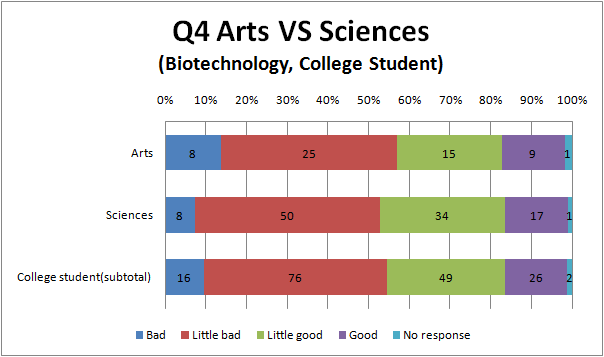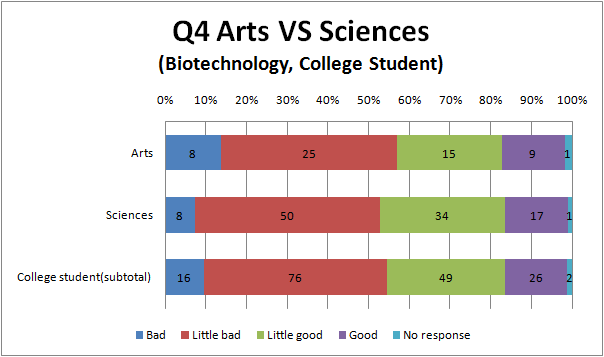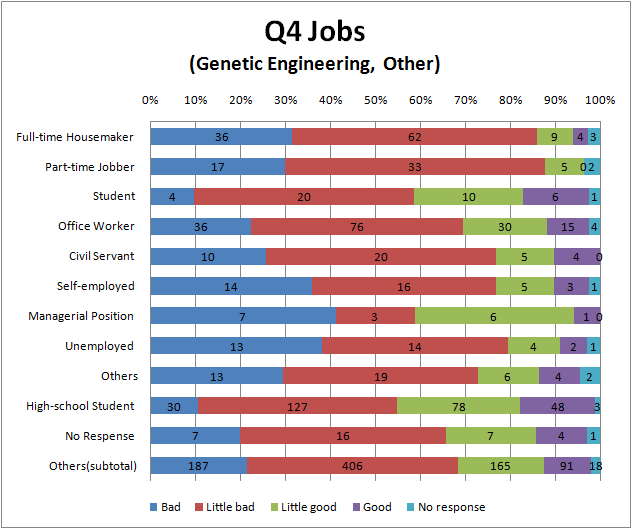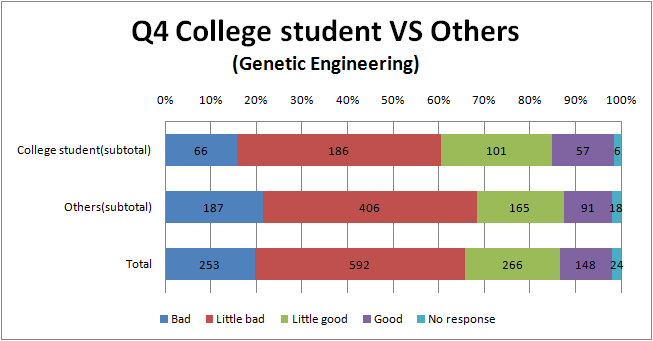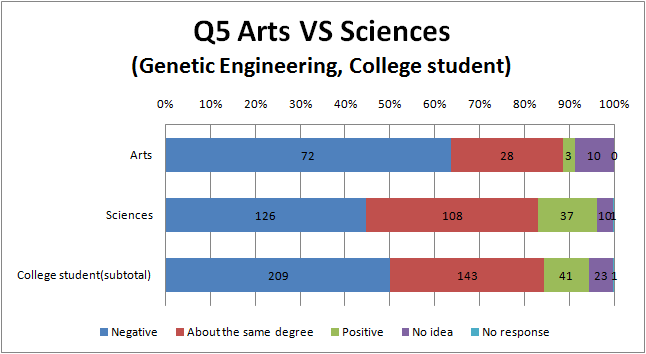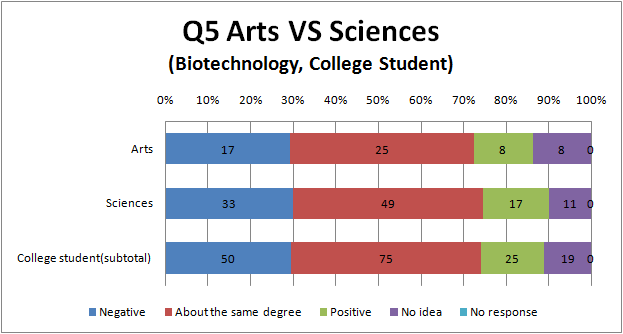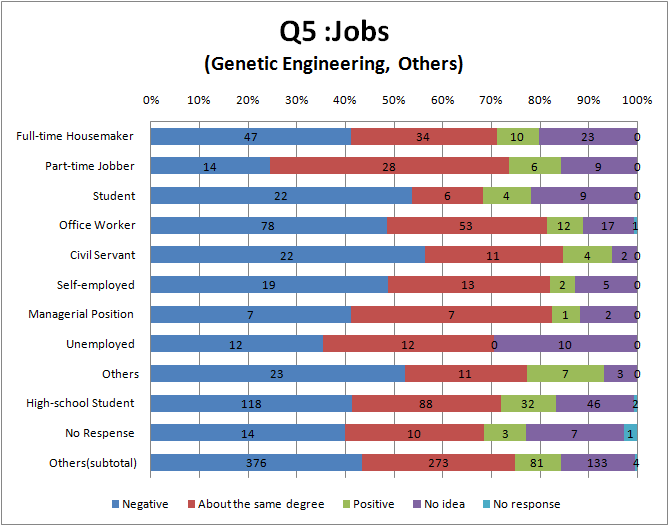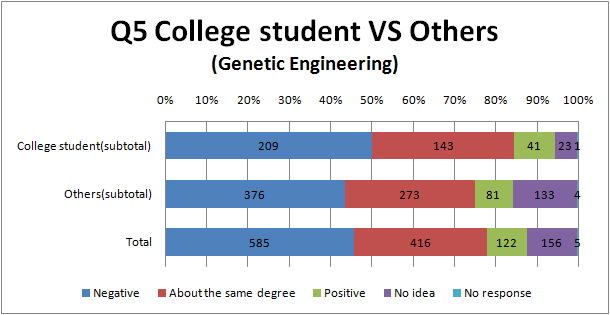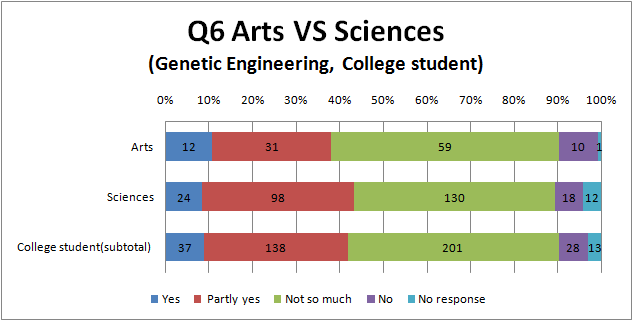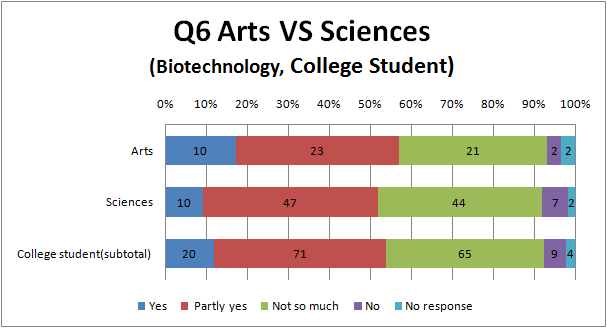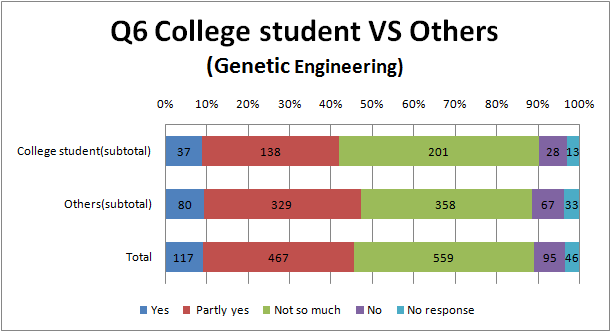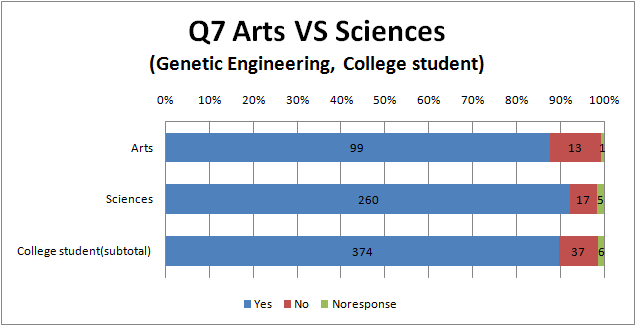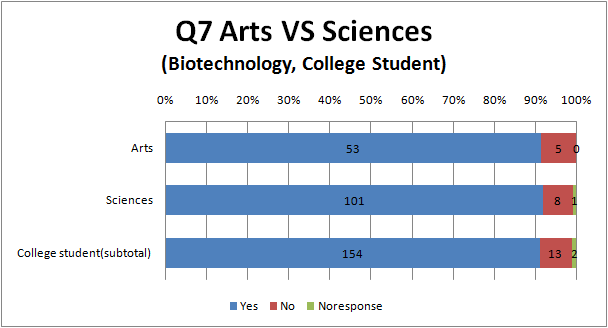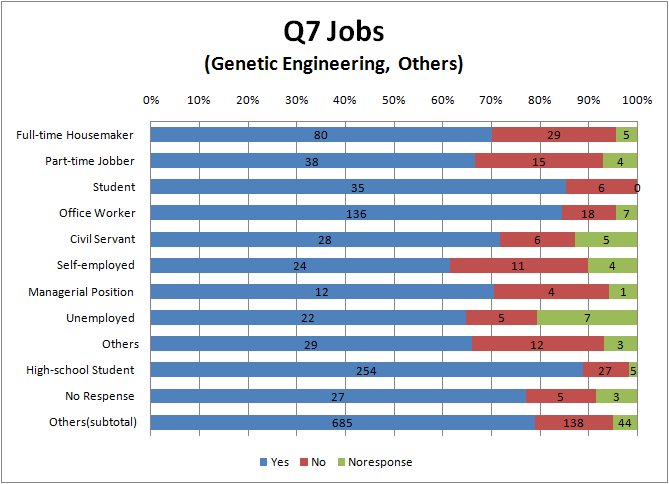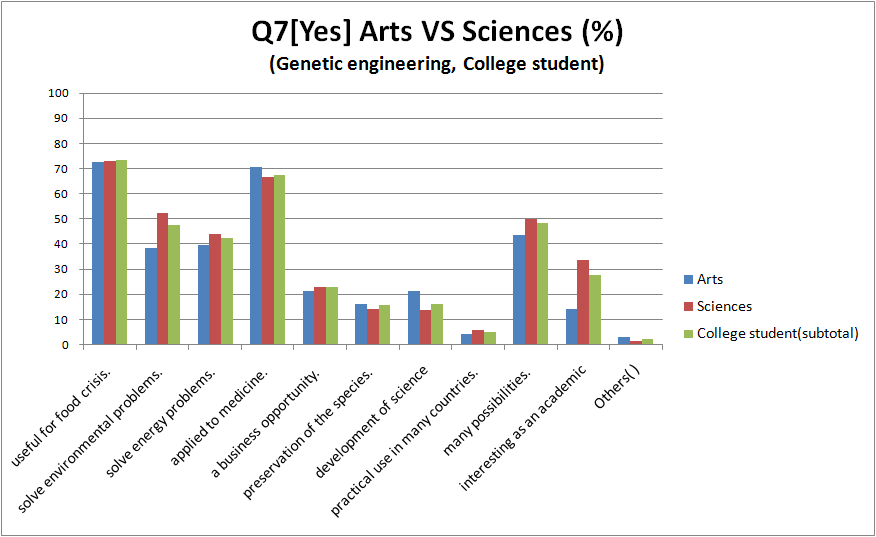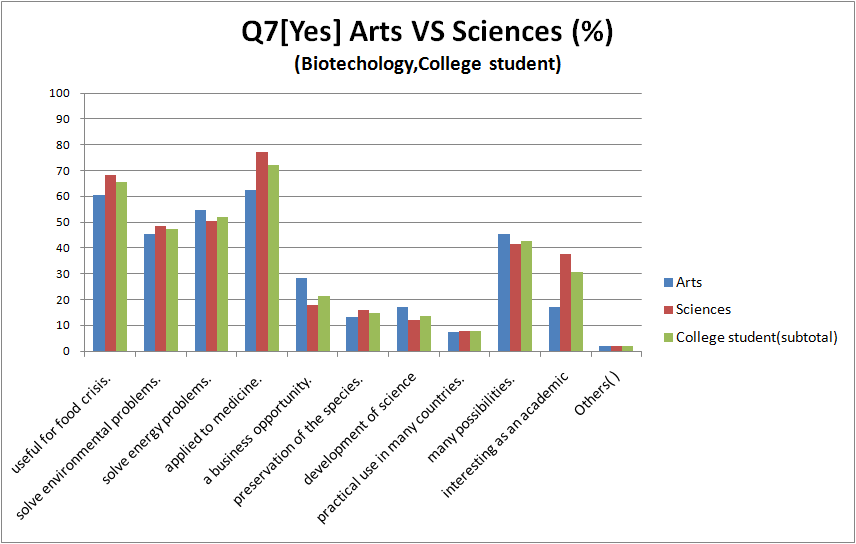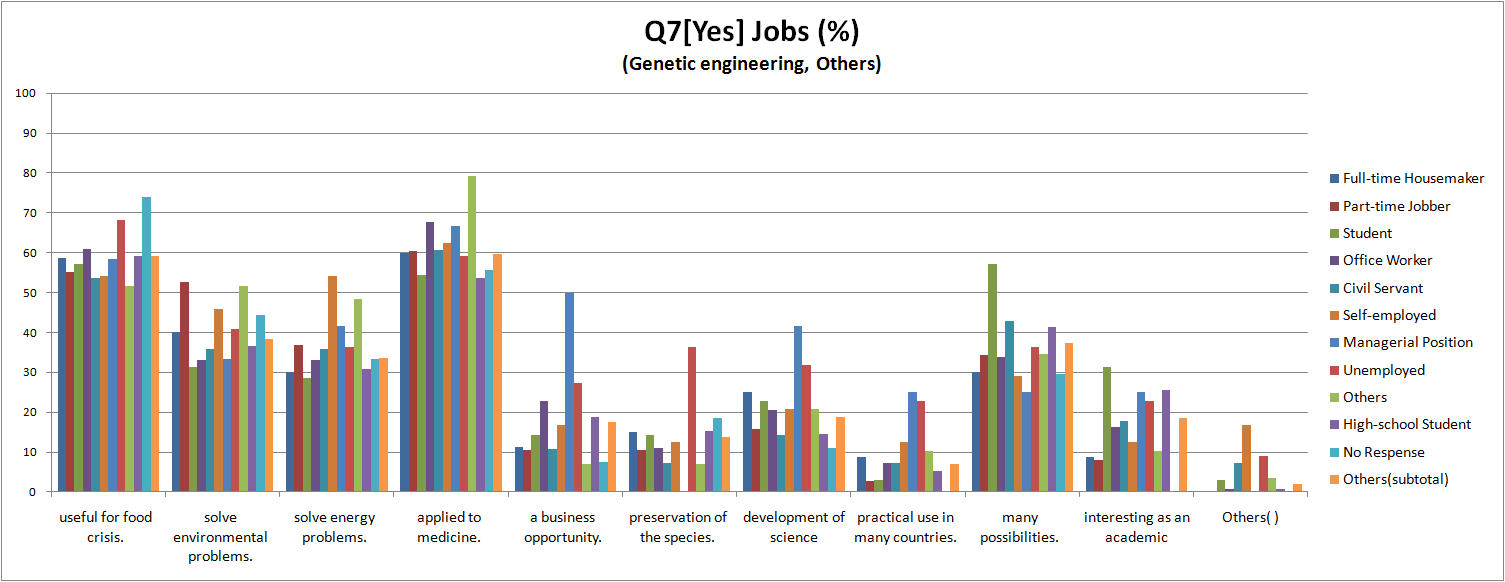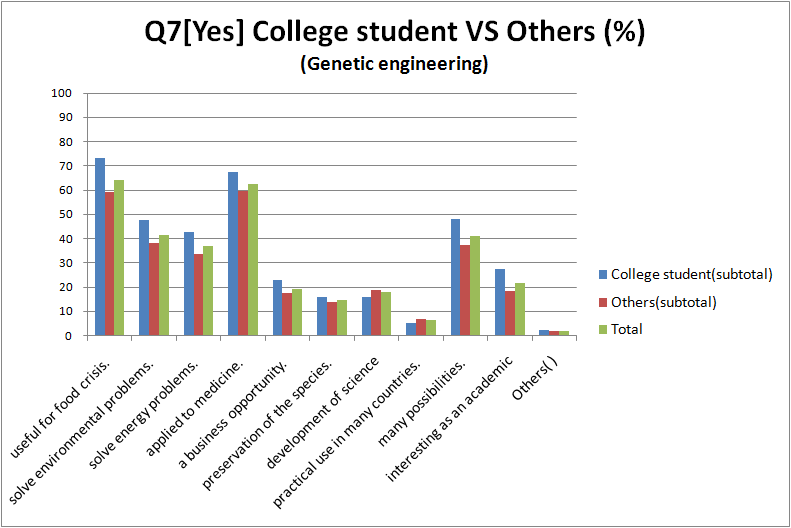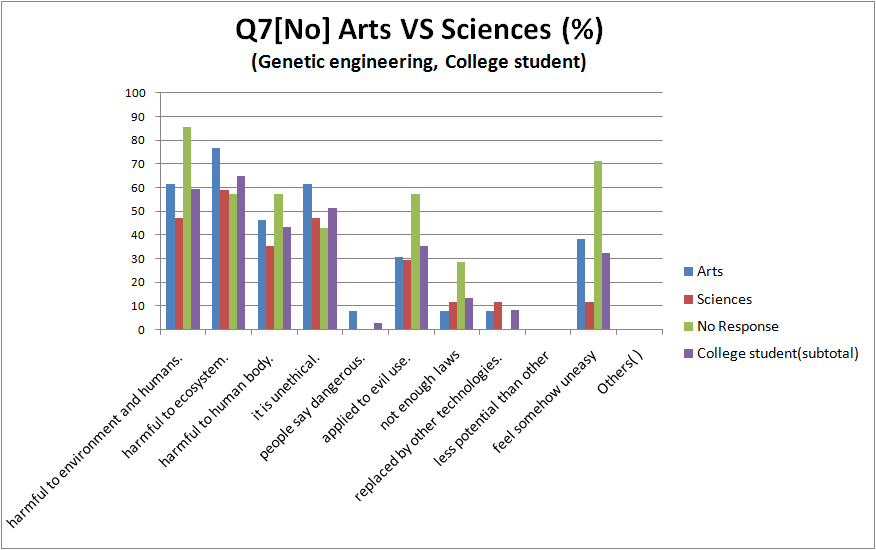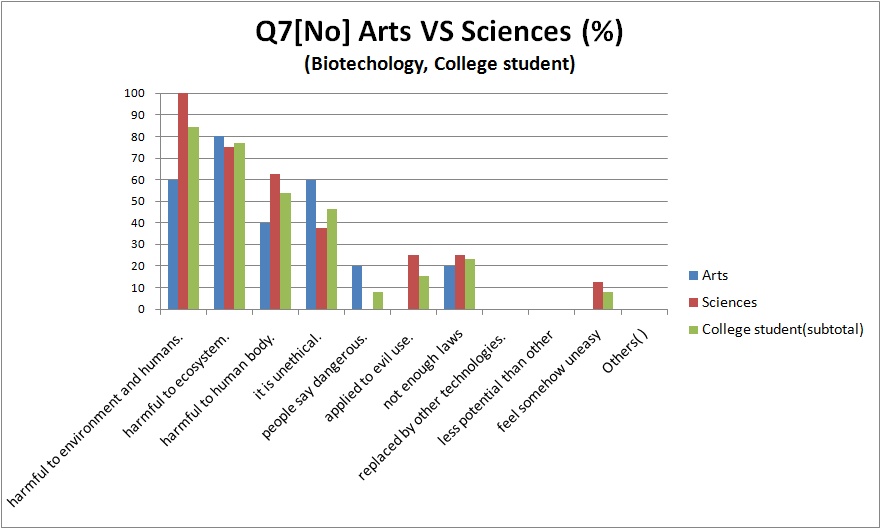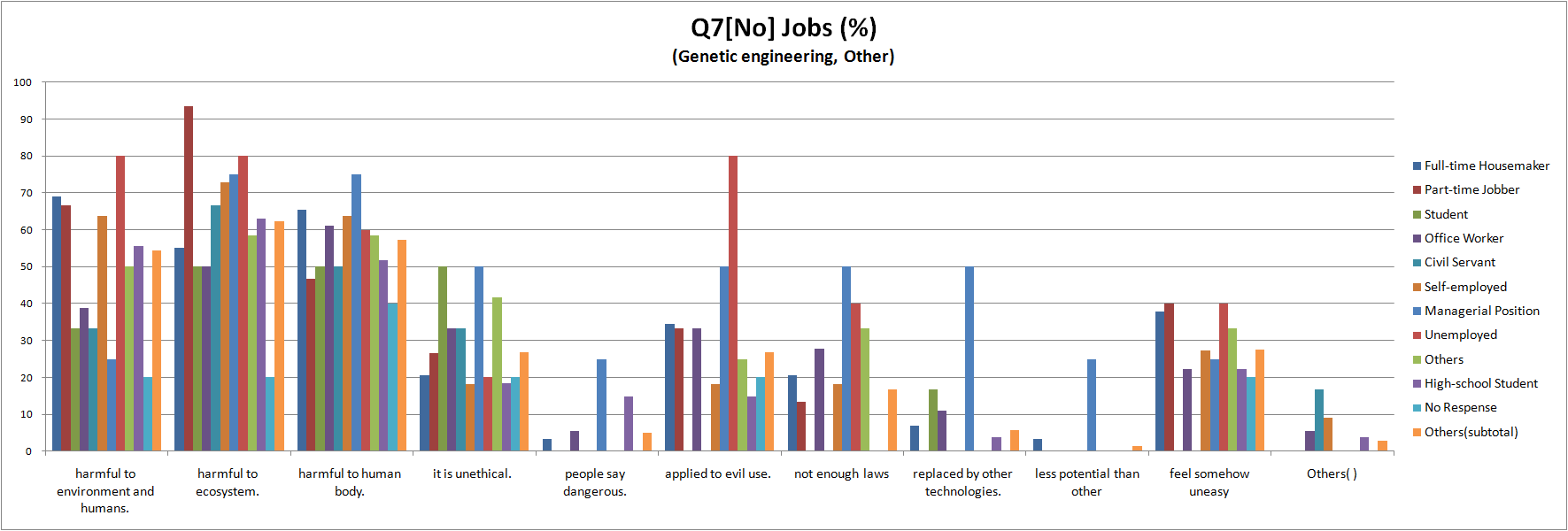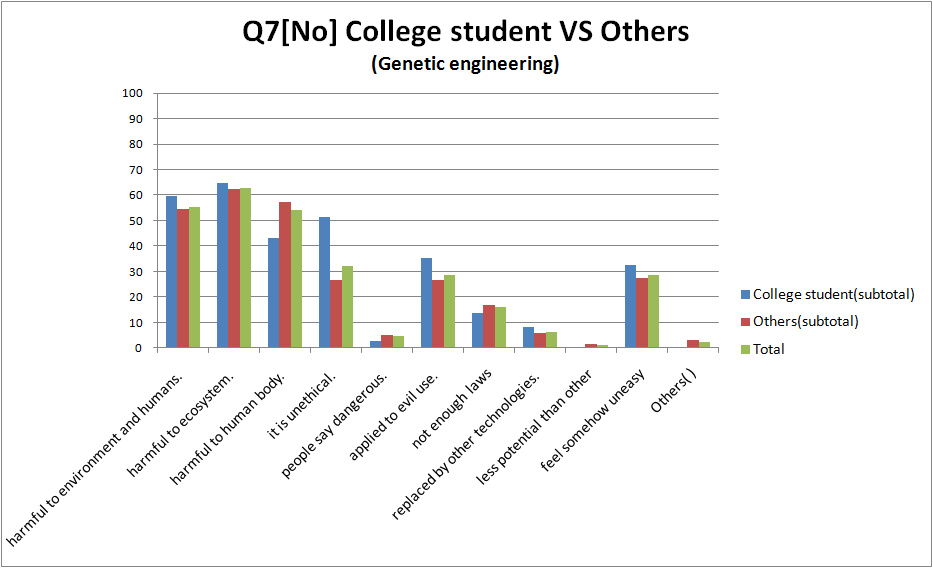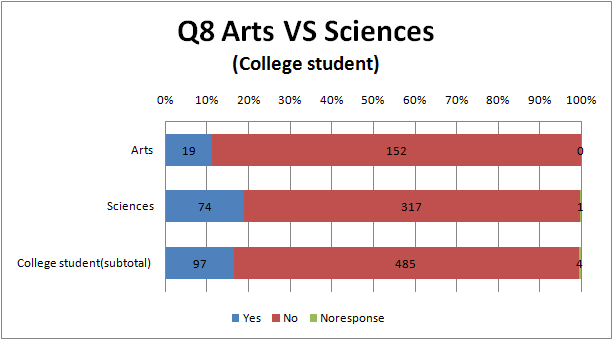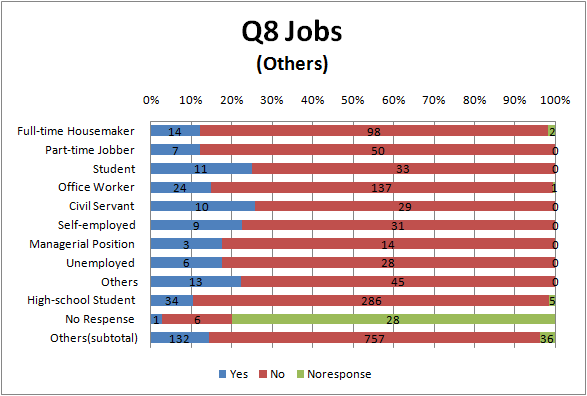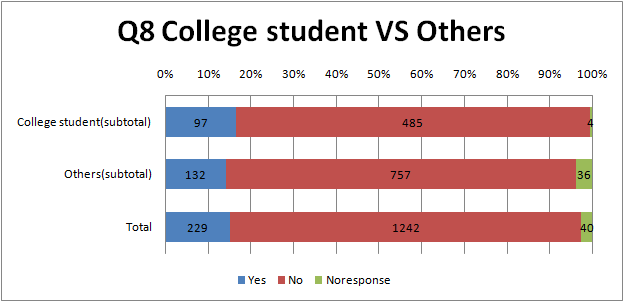Team:Kyoto/HumanPractice
From 2010.igem.org
T.yamamoto (Talk | contribs) (→Results) |
T.yamamoto (Talk | contribs) (→7 Do you think the research on ( genetic engineering or biotechnology ) should continue?) |
||
| (42 intermediate revisions not shown) | |||
| Line 1: | Line 1: | ||
{{:Team:Kyoto/Header}} | {{:Team:Kyoto/Header}} | ||
| - | == | + | ==HumanPractices== |
===Abstract=== | ===Abstract=== | ||
| - | iGEM Kyoto suggested | + | iGEM Kyoto suggested '''a nationwide survey''' to all the iGEM teams in Japan this year. Five Universities (including Kyoto) participated in this project. |
| + | We Kyoto team led other teams in the project, and successfully got '''over 1,500 answers''' in total! From the survey, we found that opinions differ between students and non-students. | ||
| + | To our little surprise, the survey also showed that the majority of Japanese regard biotechnology favorably, while at the same time they worry very much about the safety. | ||
===Introduction=== | ===Introduction=== | ||
| - | This year, we iGEM Japan carried out ”iGEM Japan Human | + | This year, we iGEM Japan carried out ”iGEM Japan Human Practices” suggested by iGEM Kyoto. In this project, we drove an attitude survey on genetic engineering and biotechnology cooperating with one another. We attempted to recognize the current situation of Japanese public view, and we will take advantage of this result for future human practice activities. |
====Motivation==== | ====Motivation==== | ||
| - | According to previous | + | According to the previous result of human practice activity, which was a survey with questions about genetic engineering, more Japanese people chose "negative" or "neutral" than the other nationalities <sup>[[#RefH001|[1]]]</sup>. In addition, it is often said that many Japanese people hate or avoid genetically modified food <sup>[[#RefH002|[2]]]</sup>. We are interested in this tendency. Thus, we attempted to investigate the reason why many Japanese people have a negative impression on genetic engineering. We made a questionnaire below, asking about the impressions on genetic engineering and words related to iGEM, or Synthetic biology. |
====Advantages==== | ====Advantages==== | ||
| - | # By | + | # By combining the results from different teams located in the different regions to share some steps of human practice activities, we can avoid labor-intensive but also improve the quality of the survey result with rich amount of samples. |
| - | # We can | + | # We can attract public attention such as Mass-media by driving this activity as iGEM Japan, than as one university team. This will be a great help for many purposes, such as announcing the activities of iGEM, inviting sponsors, or further human practices activities. |
# This project will be a good opportunity to deepen the relationships between each Japanese iGEMers. Actually, we are planning iGEM JAPAN project, which includes not only human practice activities but also construction of iGEM JAPAN Website, PR by magazines and participation in symposiums for example. | # This project will be a good opportunity to deepen the relationships between each Japanese iGEMers. Actually, we are planning iGEM JAPAN project, which includes not only human practice activities but also construction of iGEM JAPAN Website, PR by magazines and participation in symposiums for example. | ||
| - | [ This is the common Introduction article of participating universities of “iGEM Japan Human | + | [ This is the common Introduction article of participating universities of “iGEM Japan Human Practices”([[Team:KIT-Kyoto|KIT-Kyoto]], [[Team:Kyoto|Kyoto]], [[Team:Osaka|Osaka]], [[Team:Tokyo_Metropolitan|Tokyo_Metropolitan]], and [[Team:UT-Tokyo|UT-Tokyo]]). iGEM Kyoto has the responsibility for the wording. ] |
| Line 23: | Line 25: | ||
===Methods=== | ===Methods=== | ||
| - | Five out of the nine Japanese teams, [[Team:KIT-Kyoto|KIT-Kyoto]], [[Team:Kyoto|Kyoto]], [[Team:Osaka|Osaka]], [[Team:Tokyo_Metropolitan|Tokyo_Metropolitan]], and [[Team:UT-Tokyo|UT-Tokyo]] took part in this project. We all used paper-based | + | Five out of the nine Japanese teams, [[Team:KIT-Kyoto|KIT-Kyoto]], [[Team:Kyoto|Kyoto]], [[Team:Osaka|Osaka]], [[Team:Tokyo_Metropolitan|Tokyo_Metropolitan]], and [[Team:UT-Tokyo|UT-Tokyo]] took part in this project. We all used paper-based questionnaires, but the sites for the survey and the terms used in the questions varied depending on the team. |
| - | + | The survey was conducted from June 30 to September 26 in places near our universities. | |
====Targets, Terms, and Places==== | ====Targets, Terms, and Places==== | ||
| Line 61: | Line 63: | ||
====Questionnaire==== | ====Questionnaire==== | ||
| - | We | + | We prepared two (very similar) questionnaires: "Attitude survey of genetic engineering" and "Attitude survey of biotechnology." They are almost the same, but "Attitude survey of biotechnology" contains a little different question from "Attitude survey of genetic engineering". We only changed the word "genetic engineering" of the survey for "biotechnology" in order to make "Attitude survey of biotechnology." |
And we attempted to indicate difference of image between "genetic engineering" and "biotechnology". | And we attempted to indicate difference of image between "genetic engineering" and "biotechnology". | ||
| Line 67: | Line 69: | ||
| - | + | Attitudes survey of ( genetic engineering or biotechnology ) | |
| - | # When shopping, do you buy " | + | # When shopping, do you buy "non-genetically modified food”? |
#* [ Always buy / Tend to buy / Hardly mind / Not mind / I have never seen such an indication ] | #* [ Always buy / Tend to buy / Hardly mind / Not mind / I have never seen such an indication ] | ||
# What do you associate with ( genetic engineering or biotechnology )? (※Please encircle all that apply) | # What do you associate with ( genetic engineering or biotechnology )? (※Please encircle all that apply) | ||
| Line 124: | Line 126: | ||
We analyzed mainly following points. | We analyzed mainly following points. | ||
* compare between arts and science(*) in college student | * compare between arts and science(*) in college student | ||
| - | * compare | + | * compare between "genetic engineering" and "biotechnology" |
| - | * compare | + | * compare between people with different jobs |
| - | * compare between college student and the | + | * compare between college student and the others |
| Line 142: | Line 144: | ||
| 1 || Arts || 113 || 58 || 171 | | 1 || Arts || 113 || 58 || 171 | ||
|- | |- | ||
| - | | 2 || | + | | 2 || Sciences || 282 || 110 || 392 |
|- | |- | ||
| - | | 0 || No response || | + | | 0 || No response || 22 || 1 || 23 |
|- | |- | ||
| - | | - || Total || | + | | - || Total || 417 || 169 || 586 |
|- | |- | ||
|colspan="5"| | |colspan="5"| | ||
|- | |- | ||
| - | |colspan="5"| | + | |colspan="5"| Others |
|- | |- | ||
! No. || Job || Genetic Engineering || Biotechnology || Subtotal | ! No. || Job || Genetic Engineering || Biotechnology || Subtotal | ||
| Line 170: | Line 172: | ||
| 8 || Unemployed || 34 || 0 || 34 | | 8 || Unemployed || 34 || 0 || 34 | ||
|- | |- | ||
| - | | 9 || | + | | 9 || Others || 44 || 14 || 58 |
|- | |- | ||
| 10 || High-school Student || 286 || 39 || 325 | | 10 || High-school Student || 286 || 39 || 325 | ||
| Line 176: | Line 178: | ||
| 0 || No Response || 35 || 0 || 35 | | 0 || No Response || 35 || 0 || 35 | ||
|- | |- | ||
| - | | - || Subtotal || | + | | - || Subtotal || 867 || 58 || 925 |
|- | |- | ||
|colspan="5"| | |colspan="5"| | ||
| Line 195: | Line 197: | ||
====Graph==== | ====Graph==== | ||
| - | =====1. When shopping, do you buy " | + | =====1. When shopping, do you buy "non-genetically modified food”?===== |
* [ Always buy / Tend to buy / Hardly mind / Not mind / I have never seen such an indication ] | * [ Always buy / Tend to buy / Hardly mind / Not mind / I have never seen such an indication ] | ||
| - | [[Image:Kyoto_HP_1-1.png|440x400px|thumb|left|Fig.1.1 | + | [[Image:Kyoto_HP_1-1.png|440x400px|thumb|left|Fig.1.1 A comparison between arts and sciences. Both are college student.The number of arts plus sciences is not equal to subtotal because subtotal contains the number of no response. ]] |
| - | [[Image:Kyoto_HP_1-2.png|440x400px|thumb|right|Fig.1.2 | + | [[Image:Kyoto_HP_1-2.png|440x400px|thumb|right|Fig.1.2 A comparison between people with different Jobs (without college students).]] |
{{clear}} | {{clear}} | ||
[[Image:Kyoto_HP_1-3.png|440x400px|thumb|left|Fig.1.3 Avoidance index is an average when Always buy is 4 points, Tend to buy is 3 points, Hardly mind is 2points, and Not mind is 1point.]] | [[Image:Kyoto_HP_1-3.png|440x400px|thumb|left|Fig.1.3 Avoidance index is an average when Always buy is 4 points, Tend to buy is 3 points, Hardly mind is 2points, and Not mind is 1point.]] | ||
| - | [[Image:Kyoto_HP_1-4.png|440x400px|thumb|right|Fig.1.4 | + | [[Image:Kyoto_HP_1-4.png|440x400px|thumb|right|Fig.1.4 A comparison between college students and the others.]] |
{{clear}} | {{clear}} | ||
| - | =====2. What do you associate with ( genetic engineering or biotechnology )? (※Please | + | =====2. What do you associate with ( genetic engineering or biotechnology )? (※Please encircle all that apply)===== |
* [ Clone / GM crops (foods) / Patent / DNA / Genome / Medicine / Cosmetic / Bioethics / Virus / Artificial Life / Novel Prize / Environment / Biological weapon / iPS cells, ES cells / Biofuel / Biohazard / Others( ) ] | * [ Clone / GM crops (foods) / Patent / DNA / Genome / Medicine / Cosmetic / Bioethics / Virus / Artificial Life / Novel Prize / Environment / Biological weapon / iPS cells, ES cells / Biofuel / Biohazard / Others( ) ] | ||
| - | [[Image:Kyoto_HP_2-1.png|440x400px|thumb|left|Fig.2.1 This figure is comparison between arts and | + | [[Image:Kyoto_HP_2-1.png|440x400px|thumb|left|Fig.2.1 This figure is comparison between arts and sciences. Both are college student and genetic engineering survey. ]] |
[[Image:Kyoto_HP_2-2.png|440x400px|thumb|right|Fig.2.2 This is comparison between genetic engineering and biotechnology. Both are college student.]] | [[Image:Kyoto_HP_2-2.png|440x400px|thumb|right|Fig.2.2 This is comparison between genetic engineering and biotechnology. Both are college student.]] | ||
{{clear}} | {{clear}} | ||
| - | [[Image:Kyoto_HP_2-3.png|440x400px|thumb|left|Fig.2.3 This is comparison between college students and the | + | [[Image:Kyoto_HP_2-3.png|440x400px|thumb|left|Fig.2.3 This is comparison between college students and the others. Both are genetic engineering survey.]] |
{{clear}} | {{clear}} | ||
| Line 222: | Line 224: | ||
* [ Not mind I use / Hardly mind I use / If possible, I don't want to use / I must not use / I don't know ] | * [ Not mind I use / Hardly mind I use / If possible, I don't want to use / I must not use / I don't know ] | ||
| - | [[Image:Kyoto_HP_3-1.png|440x400px|thumb|left|Fig.3.1 This figure is comparison between arts and | + | [[Image:Kyoto_HP_3-1.png|440x400px|thumb|left|Fig.3.1 This figure is comparison between arts and sciences. Both are college student and genetic engineering survey. The number of arts plus sciences is not equal to subtotal because subtotal contains the number of no response. ]] |
| - | [[Image:Kyoto_HP_3-2.png|440x400px|thumb|right|Fig.3.2 This figure is comparison between arts and | + | [[Image:Kyoto_HP_3-2.png|440x400px|thumb|right|Fig.3.2 This figure is comparison between arts and sciences. Both are college student and biotechnology survey. The number of arts plus sciences is not equal to subtotal because subtotal contains the number of no response.]] |
{{clear}} | {{clear}} | ||
| - | [[Image:Kyoto_HP_3-3.png|440x400px|thumb|left|Fig.3.3 This is comparison | + | [[Image:Kyoto_HP_3-3.png|440x400px|thumb|left|Fig.3.3 This is comparison between people with different jobs (without collge student). All are genetic engineering survey.]] |
| - | [[Image:Kyoto_HP_3-4.png|440x400px|thumb|right|Fig.3.4 This is comparison between college student and the | + | [[Image:Kyoto_HP_3-4.png|440x400px|thumb|right|Fig.3.4 This is comparison between college student and the others. Both are genetic engineering survey.]] |
{{clear}} | {{clear}} | ||
| Line 234: | Line 236: | ||
* [ Bad / Little bad / Little good / Good ] | * [ Bad / Little bad / Little good / Good ] | ||
| - | [[Image:Kyoto_HP_4-1.png|440x400px|thumb|left|Fig.4.1 This figure is comparison between arts and | + | [[Image:Kyoto_HP_4-1.png|440x400px|thumb|left|Fig.4.1 This figure is comparison between arts and sciences. Both are college student and genetic engineering survey. The number of arts plus sciences is not equal to subtotal because subtotal contains the number of no response. ]] |
| - | [[Image:Kyoto_HP_4-2.png|440x400px|thumb|right|Fig.4.2 This figure is comparison between arts and | + | [[Image:Kyoto_HP_4-2.png|440x400px|thumb|right|Fig.4.2 This figure is comparison between arts and sciences. Both are college student and biotechnology survey. The number of arts plus sciences is not equal to subtotal because subtotal contains the number of no response.]] |
{{clear}} | {{clear}} | ||
| - | [[Image:Kyoto_HP_4-3.png|440x400px|thumb|left|Fig.4.3 This is comparison | + | [[Image:Kyoto_HP_4-3.png|440x400px|thumb|left|Fig.4.3 This is comparison between people with different jobs (without collge student). All are genetic engineering survey.]] |
| - | [[Image:Kyoto_HP_4-4.png|440x400px|thumb|right|Fig.4.4 This is comparison between college student and the | + | [[Image:Kyoto_HP_4-4.png|440x400px|thumb|right|Fig.4.4 This is comparison between college student and the others. Both are genetic engineering survey.]] |
{{clear}} | {{clear}} | ||
| Line 246: | Line 248: | ||
#* [ Negative / About the same degree / Positive / No idea ] | #* [ Negative / About the same degree / Positive / No idea ] | ||
| - | [[Image:Kyoto_HP_5-1.png|440x400px|thumb|left|Fig.5.1 This figure is comparison between arts and | + | [[Image:Kyoto_HP_5-1.png|440x400px|thumb|left|Fig.5.1 This figure is comparison between arts and sciences. Both are college student and genetic engineering survey. The number of arts plus sciences is not equal to subtotal because subtotal contains the number of no response. ]] |
| - | [[Image:Kyoto_HP_5-2.png|440x400px|thumb|right|Fig.5.2 This figure is comparison between arts and | + | [[Image:Kyoto_HP_5-2.png|440x400px|thumb|right|Fig.5.2 This figure is comparison between arts and sciences. Both are college student and biotechnology survey. The number of arts plus sciences is not equal to subtotal because subtotal contains the number of no response.]] |
{{clear}} | {{clear}} | ||
| - | [[Image:Kyoto_HP_5-3.png|440x400px|thumb|left|Fig.5.3 This is comparison | + | [[Image:Kyoto_HP_5-3.png|440x400px|thumb|left|Fig.5.3 This is comparison between people with different jobs (without collge student). All are genetic engineering survey.]] |
| - | [[Image:Kyoto_HP_5-4.png|440x400px|thumb|right|Fig.5.4 This is comparison between college student and the | + | [[Image:Kyoto_HP_5-4.png|440x400px|thumb|right|Fig.5.4 This is comparison between college student and the others. Both are genetic engineering survey.]] |
{{clear}} | {{clear}} | ||
| Line 258: | Line 260: | ||
* [ Yes / Partly yes / Not so much / No ] | * [ Yes / Partly yes / Not so much / No ] | ||
| - | [[Image:Kyoto_HP_6-1.png|440x400px|thumb|left|Fig.6.1 This figure is comparison between arts and | + | [[Image:Kyoto_HP_6-1.png|440x400px|thumb|left|Fig.6.1 This figure is comparison between arts and sciences. Both are college student and genetic engineering survey. The number of arts plus sciences is not equal to subtotal because subtotal contains the number of no response. ]] |
| - | [[Image:Kyoto_HP_6-2.png|440x400px|thumb|right|Fig.6.2 This figure is comparison between arts and | + | [[Image:Kyoto_HP_6-2.png|440x400px|thumb|right|Fig.6.2 This figure is comparison between arts and sciences. Both are college student and biotechnology survey. The number of arts plus sciences is not equal to subtotal because subtotal contains the number of no response.]] |
{{clear}} | {{clear}} | ||
| - | [[Image:Kyoto_HP_6-3.png|440x400px|thumb|left|Fig.6.3 This is comparison | + | [[Image:Kyoto_HP_6-3.png|440x400px|thumb|left|Fig.6.3 This is comparison between people with different jobs (without collge student). All are genetic engineering survey.]] |
| - | [[Image:Kyoto_HP_6-4.png|440x400px|thumb|right|Fig.6.4 This is comparison between college student and the | + | [[Image:Kyoto_HP_6-4.png|440x400px|thumb|right|Fig.6.4 This is comparison between college student and the others. Both are genetic engineering survey.]] |
{{clear}} | {{clear}} | ||
| Line 270: | Line 272: | ||
* [ Yes / No ] | * [ Yes / No ] | ||
| - | [[Image:Kyoto_HP_7-1.png|440x400px|thumb|left|Fig.7.1 This figure is comparison between arts and | + | [[Image:Kyoto_HP_7-1.png|440x400px|thumb|left|Fig.7.1 This figure is comparison between arts and sciences. Both are college student and genetic engineering survey. The number of arts plus sciences is not equal to subtotal because subtotal contains the number of no response. ]] |
| - | [[Image:Kyoto_HP_7-2.png|440x400px|thumb|right|Fig.7.2 This figure is comparison between arts and | + | [[Image:Kyoto_HP_7-2.png|440x400px|thumb|right|Fig.7.2 This figure is comparison between arts and sciences. Both are college student and biotechnology survey. The number of arts plus sciences is not equal to subtotal because subtotal contains the number of no response.]] |
{{clear}} | {{clear}} | ||
| - | [[Image:Kyoto_HP_7-3.png|440x400px|thumb|left|Fig.7.3 This is comparison | + | [[Image:Kyoto_HP_7-3.png|440x400px|thumb|left|Fig.7.3 This is comparison between people with different jobs (without collge student). All are genetic engineering survey.]] |
| - | [[Image:Kyoto_HP_7-4.png|440x400px|thumb|right|Fig.7.4 This is comparison between college student and the | + | [[Image:Kyoto_HP_7-4.png|440x400px|thumb|right|Fig.7.4 This is comparison between college student and the others. Both are genetic engineering survey.]] |
{{clear}} | {{clear}} | ||
| - | *If you answered [Yes], please | + | *If you answered [Yes], please encircle every fit reason from below. |
*# Because it may be useful for food crisis. | *# Because it may be useful for food crisis. | ||
*# Because it may solve environmental problems. | *# Because it may solve environmental problems. | ||
*# Because it may solve energy problems. | *# Because it may solve energy problems. | ||
*# Because it may be applied to medicine. | *# Because it may be applied to medicine. | ||
| - | *# Because it may | + | *# Because it may create a business opportunity. |
| - | *# Because it can | + | *# Because it can be used in the preservation of the species. |
*# Because it symbolizes the development of science and technology. | *# Because it symbolizes the development of science and technology. | ||
*# Because it has already been put to practical use in many countries. | *# Because it has already been put to practical use in many countries. | ||
| - | *# Because it has | + | *# Because it has many possibilities. |
| - | *# Because it is interesting as academic. | + | *# Because it is interesting as an academic subject or research topic. |
*# Others( ) | *# Others( ) | ||
| - | [[Image:Kyoto_HP_7a-1.png|440x400px|thumb|left|Fig.7a.1 This figure is comparison between arts and | + | [[Image:Kyoto_HP_7a-1.png|440x400px|thumb|left|Fig.7a.1 This figure is comparison between arts and sciences. Both are college student and genetic engineering survey. This proportion is only about those who answered [Yes] to Q7.]] |
| - | [[Image:Kyoto_HP_7a-2.png|440x400px|thumb|right|Fig.7a.2 This figure is comparison | + | [[Image:Kyoto_HP_7a-2.png|440x400px|thumb|right|Fig.7a.2 This figure is comparison between arts and sciences. Both are college student and biotechnology survey. This proportion is only about those who answered [Yes] to Q7.]] |
{{clear}} | {{clear}} | ||
[[Image:Kyoto_HP_7a-3.png|900x400px|thumb|center|Fig.7a.3 This is comparison in job (without college student). All are genetic engineering survey. This proportion is only about those who answered [Yes] to Q7.]] | [[Image:Kyoto_HP_7a-3.png|900x400px|thumb|center|Fig.7a.3 This is comparison in job (without college student). All are genetic engineering survey. This proportion is only about those who answered [Yes] to Q7.]] | ||
| - | [[Image:Kyoto_HP_7a-4.png|440x400px|thumb|left|Fig.7a.4 This is comparison between college student and the | + | [[Image:Kyoto_HP_7a-4.png|440x400px|thumb|left|Fig.7a.4 This is comparison between college student and the others. Both are genetic engineering survey. This proportion is only about those who answered [Yes] to Q7.]] |
{{clear}} | {{clear}} | ||
| - | *If you answered [No], please | + | *If you answered [No], please encircle every reason from below. |
*# Because it can create evil things harmful to environment and humans. | *# Because it can create evil things harmful to environment and humans. | ||
*# Because products of it can be harmful to ecosystem. | *# Because products of it can be harmful to ecosystem. | ||
*# Because products of it can be harmful to human body. | *# Because products of it can be harmful to human body. | ||
| - | *# Because | + | *# Because it is unethical. |
*# Because people say it is dangerous. | *# Because people say it is dangerous. | ||
*# Because it can be applied to evil use. | *# Because it can be applied to evil use. | ||
| Line 313: | Line 315: | ||
*# Because it can be replaced by other technologies. | *# Because it can be replaced by other technologies. | ||
*# Because it seems to have less potential than other technologies. | *# Because it seems to have less potential than other technologies. | ||
| - | *# Because I feel somehow uneasy. | + | *# Because I feel somehow uneasy in using it. |
| - | [[Image:Kyoto_HP_7b-1.png|440x400px|thumb|left|Fig.7b.1 This figure is comparison between arts and | + | [[Image:Kyoto_HP_7b-1.png|440x400px|thumb|left|Fig.7b.1 This figure is comparison between arts and sciences. Both are college student and genetic engineering survey. This proportion is only about those who answered [No] to Q7.]] |
| - | [[Image:Kyoto_HP_7b-2.png|440x400px|thumb|right|Fig.7b.2 This figure is comparison between arts and | + | [[Image:Kyoto_HP_7b-2.png|440x400px|thumb|right|Fig.7b.2 This figure is comparison between arts and sciences. Both are college student and biotechnology survey. This proportion is only about those who answered [No] to Q7.]] |
{{clear}} | {{clear}} | ||
| - | [[Image:Kyoto_HP_7b-3.png|900x400px|thumb|center|Fig.7b.3 This is comparison in job (without | + | [[Image:Kyoto_HP_7b-3.png|900x400px|thumb|center|Fig.7b.3 This is comparison in job (without college student). All are genetic engineering survey. This proportion is only about those who answered [No] to Q7.]] |
| - | [[Image:Kyoto_HP_7b-4.png|440x400px|thumb|left|Fig.7b.4 This is comparison between college student and the | + | [[Image:Kyoto_HP_7b-4.png|440x400px|thumb|left|Fig.7b.4 This is comparison between college student and the others. Both are genetic engineering survey. This proportion is only about those who answered [No] to Q7.]] |
{{clear}} | {{clear}} | ||
| Line 325: | Line 327: | ||
* [ Yes / No ] | * [ Yes / No ] | ||
| - | [[Image:Kyoto_HP_8-1.png|440x400px|thumb|left|Fig.8.1 This figure is comparison between arts and | + | [[Image:Kyoto_HP_8-1.png|440x400px|thumb|left|Fig.8.1 This figure is comparison between arts and sciences. Both are college student. The number of arts plus sciences is not equal to subtotal because subtotal contains the number of no response. ]] |
| - | [[Image:Kyoto_HP_8-2.png|440x400px|thumb|right|Fig.8.2 This is comparison | + | [[Image:Kyoto_HP_8-2.png|440x400px|thumb|right|Fig.8.2 This is comparison between people with different jobs (without collge student).]] |
{{clear}} | {{clear}} | ||
| - | [[Image:Kyoto_HP_8-3.png|440x400px|thumb|left|Fig.8.3 This is comparison between college student and the | + | [[Image:Kyoto_HP_8-3.png|440x400px|thumb|left|Fig.8.3 This is comparison between college student and the others.]] |
{{clear}} | {{clear}} | ||
| Line 344: | Line 346: | ||
=====Q1===== | =====Q1===== | ||
| - | * To see Fig.1.3, avoidance degree of Full-time House maker and part-time jobber is higher than others, and | + | * To see Fig.1.3, avoidance degree of Full-time House maker and part-time jobber is higher than others, and that of college student and High school student is lower. |
| - | ** This result suggests that Full-time House maker and part-time jobber tend to have concerns about food labeling because they have more opportunities | + | ** This result suggests that Full-time House maker and part-time jobber tend to have concerns about food labeling because they have more opportunities to purchase foods than other occupations. |
** It may be because “students are less conscious of food”, ”students put a higher value on other heads such as price rather than food safety ” or ”students apply to GM foods” | ** It may be because “students are less conscious of food”, ”students put a higher value on other heads such as price rather than food safety ” or ”students apply to GM foods” | ||
| - | *** | + | *** About “students apply to GM foods”, contemporary students have had a debate on GM foods at least once in high school or junior high school. So they may tend to have positive opinions because they probably have more knowledge and opinions on GM foods than people |
=====Q2===== | =====Q2===== | ||
| - | *The phrases “Cloning”, ”GM foods” and ”DNA” are highly | + | *The phrases “Cloning”, ”GM foods” and ”DNA” are highly chosen by people. |
**Because, speaking of genes or biotechnology, people especially has a strong impression about DNA, many people may have chosen “DNA”. | **Because, speaking of genes or biotechnology, people especially has a strong impression about DNA, many people may have chosen “DNA”. | ||
*When questionnaire sheets title is “genetic modification”, the phrase ”GM foods” was highly responded. More than half of people respond. | *When questionnaire sheets title is “genetic modification”, the phrase ”GM foods” was highly responded. More than half of people respond. | ||
*When questionnaire sheets title is “biotechnology”, the phrases ”environment”, “biofuel” and “biohazard” was highly responded, related to genetic modification sheets. | *When questionnaire sheets title is “biotechnology”, the phrases ”environment”, “biofuel” and “biohazard” was highly responded, related to genetic modification sheets. | ||
| - | **Moreover, because biotechnology survey include the word “bio”, the phrases ”biofuel” and | + | **Moreover, because biotechnology survey include the word “bio”, the phrases ”biofuel” and “biohazard” was responded more higher than “genetic modification” sheets. |
| - | *The result may suggest that the word | + | *The result may suggest that the word “genome” was lower acknowledged by people. |
*The tendency of answer shows that this is accurate information in terms of association, since figures of graphs are same as a whole. | *The tendency of answer shows that this is accurate information in terms of association, since figures of graphs are same as a whole. | ||
| Line 365: | Line 367: | ||
=====Q3===== | =====Q3===== | ||
| - | *To see Fig.3.3 and Fig.3.4, there seems to be the same tendency as Question 1. | + | *To see Fig.3.3 and Fig.3.4, there seems to be the same tendency as Question 1. Full-time House maker and part-time jobber relatively avoid genetic engineering or biotechnology, and college student and High school student relatively accept them. |
**we think that it is similar reason to Q1 why there is the tendency like this. | **we think that it is similar reason to Q1 why there is the tendency like this. | ||
| - | *There are hardly | + | *There are hardly any differences between the result of genetic engineering and biotechnology. |
=====Q4===== | =====Q4===== | ||
| - | *College student and high school student think that | + | *College student and high school student think that they can do genetic engineering than the other. |
*In addition, we find out that less Arts than Science feel genetic engineering bad. | *In addition, we find out that less Arts than Science feel genetic engineering bad. | ||
| - | * | + | *We think that it is similar reason to Q1 and Q3 why there is the tendency like this. |
| - | *There are hardly | + | *There are hardly any differences between the result of genetic engineering and biotechnology. |
=====Q5===== | =====Q5===== | ||
| - | * | + | *The number of people who answered to survey of genetic engineering is larger than that of biotechnology think that negative information is major. |
| - | **Now, Japanese | + | **Now, Japanese tend to have a bad impression on the word ‘genetic engineering’. On the other hand, Japanese does not feel biotechnology so bad. |
| - | *There are hardly | + | *There are hardly any differences between the result of university students and the others. |
*Most Arts among all groups think that negative information is major. | *Most Arts among all groups think that negative information is major. | ||
=====Q6===== | =====Q6===== | ||
| - | *Surprisingly, there are hardly | + | *Surprisingly, there are hardly any differences between the result of university students and the others. |
| - | * | + | *Comparing between Fig6.1 and Fig.6.2, there are a little more people answering ‘Yes’ in the survey of biotechnology than genetic engineering. |
| - | **It also | + | **It is also suggested that Japanese people have more positive impression on biotechnology than on genetic engineering. |
| - | *Although Japanese iPS cell study becomes big news, there are hardly | + | *Although Japanese iPS cell study becomes a big news, there are hardly any differences between the result of ‘Yes’ and ‘No’, and this situation is mysterious. |
=====Q7===== | =====Q7===== | ||
| - | The | + | The proportion of “continue” to “stop” |
*The overwhelming majority responded to “yes”. | *The overwhelming majority responded to “yes”. | ||
| - | **Although people(especially the public) don’t have a good impression | + | **Although people (especially the public) don’t have a good impression on GM foods and genetic recombination at previous question, while more than eight-tenth of people respond to “continue research” here. This means that whether people agree or not depends on research content. |
| - | *College student | + | *College student chose much more “continue” than the others. |
| - | *There | + | *There are hardly any differences between “biotechnology” and “genetic modification”. |
The reason that the research should continue | The reason that the research should continue | ||
| - | *There are hardly differences between College student and the Other..All have almost same tendency. | + | *There are hardly any differences between College student and the Other..All have almost same tendency. |
| - | *Quite people answered “useful for food crisis”, ‘solve environmental problems”, “applied to medicine” or “it has potential”. | + | *Quite many people answered “useful for food crisis”, ‘solve environmental problems”, “applied to medicine” or “it has potential”. |
**People expected genetic engineering and biotechnology in the future. | **People expected genetic engineering and biotechnology in the future. | ||
The reason that the research shouldn't continue | The reason that the research shouldn't continue | ||
| - | *Quite people chose “harmful to environment and humans”, “can be harmful to ecosystem” and “harmful to human body” | + | *Quite many people chose “harmful to environment and humans”, “can be harmful to ecosystem” and “harmful to human body” |
*There are no big differences between biotechnology and genetic engineering. | *There are no big differences between biotechnology and genetic engineering. | ||
| Line 410: | Line 412: | ||
Summarization of Question 7 | Summarization of Question 7 | ||
*Solution to food, energy, environmental issues and medical treatments is expected. | *Solution to food, energy, environmental issues and medical treatments is expected. | ||
| - | *Many people worry about harmful effects on the environment or on us. | + | *Many people worry about harmful effects on the environment or on us. Some people say GM is against their moral values. |
| - | **Some of these worry may come from ignorance about genetic engineering and biotechnology. We hope we can relieve their worries | + | **Some of these worry may come from ignorance about genetic engineering and biotechnology. We hope we can relieve their worries by explaining to them more in detail. |
=====Q8===== | =====Q8===== | ||
*The result that only 10~20 percent of whole knows this term, shows that this term have hardly spread to people. | *The result that only 10~20 percent of whole knows this term, shows that this term have hardly spread to people. | ||
| - | **We think that the most contribution of this questionnaire is that 1242 person know this term. | + | **We think that the most contribution of this questionnaire is that 1242 person now know this term. |
| - | *There | + | *There aren’t large difference between university students and the Other |
| Line 425: | Line 427: | ||
=====Overall tendency===== | =====Overall tendency===== | ||
| - | The big difference in Japanese | + | The big difference of opinions in Japanese people comes from whether the subjects of a survey are student (including college and high school) or not. This difference might come from the following reasons. |
| - | *It comes from difference of generation. For example, when college student or high school student were | + | *It comes from difference of generation. For example, when college student or high school student were children, Dolly was already born (1996). |
| - | *It comes from difference of education. Contemporary students are taught about genetic engineering and biotechnology in school. They probably have more | + | *It comes from difference of education. Contemporary students are taught about genetic engineering and biotechnology in school. They probably have more knowledge than the others about genetic engineering and biotechnology. |
| - | *It comes from the amount of chance of household chores, especially shopping. Students do | + | *It comes from the amount of chance of household chores, especially shopping. Students do not spend much time for shopping compared with house maker. |
According to the results of the questionnaire about both genetic engineering and biotechnology, over half of the subjects said that "the research should continue" in Q7, while most subjects have "a negative image" (Q1, Q3, Q4, Q5). It seems that people only have abstract and unclear image to this 'professional' technique. Genetic engineering is not still so common in Japan. | According to the results of the questionnaire about both genetic engineering and biotechnology, over half of the subjects said that "the research should continue" in Q7, while most subjects have "a negative image" (Q1, Q3, Q4, Q5). It seems that people only have abstract and unclear image to this 'professional' technique. Genetic engineering is not still so common in Japan. | ||
| Line 435: | Line 437: | ||
=====Future work ===== | =====Future work ===== | ||
| - | We | + | We investigated the tendency of impressions on genetic engineering through comparison between Japanese (different ages, majors, job, and regions). We found that Students think that genetic engineering and biotechnology is not so negative as Other people.So it is necessary that the accurate knowledge about biotechnology and genetic engineering should be distributed to the public audience. However, it is difficult for us, college students, to have a frequent contact with public people. To solve this problem, we can use iGEM networks! This year iGEM Japan attracted Japanese media and our activities have been introduced by a magazine. So we can keep in touch with public people through our activities. This could be attained because we started "iGEM Japan" team instead of having one particular them. So we want to continue iGEM Japan project, and to make this project bigger. |
| - | + | ||
| - | + | ||
| - | + | ||
| Line 444: | Line 443: | ||
===Reference=== | ===Reference=== | ||
| - | |||
| - | |||
| - | |||
| - | |||
| - | |||
| - | |||
| - | |||
| - | |||
| - | |||
| - | |||
| - | |||
# [https://2009.igem.org/Team:Freiburg_bioware/Human_Practice/Ethics iGEM 2009 - Team:Freiburg_bioware] | # [https://2009.igem.org/Team:Freiburg_bioware/Human_Practice/Ethics iGEM 2009 - Team:Freiburg_bioware] | ||
# [https://2009.igem.org/Team:Valencia/Human/HumanPractices iGEM 2009 - Team:Valencia] | # [https://2009.igem.org/Team:Valencia/Human/HumanPractices iGEM 2009 - Team:Valencia] | ||
| + | |||
[[#top-section|^Top]] | [[#top-section|^Top]] | ||
---- | ---- | ||
Latest revision as of 03:04, 28 October 2010
HumanPractices
Abstract
iGEM Kyoto suggested a nationwide survey to all the iGEM teams in Japan this year. Five Universities (including Kyoto) participated in this project. We Kyoto team led other teams in the project, and successfully got over 1,500 answers in total! From the survey, we found that opinions differ between students and non-students. To our little surprise, the survey also showed that the majority of Japanese regard biotechnology favorably, while at the same time they worry very much about the safety.
Introduction
This year, we iGEM Japan carried out ”iGEM Japan Human Practices” suggested by iGEM Kyoto. In this project, we drove an attitude survey on genetic engineering and biotechnology cooperating with one another. We attempted to recognize the current situation of Japanese public view, and we will take advantage of this result for future human practice activities.
Motivation
According to the previous result of human practice activity, which was a survey with questions about genetic engineering, more Japanese people chose "negative" or "neutral" than the other nationalities [1]. In addition, it is often said that many Japanese people hate or avoid genetically modified food [2]. We are interested in this tendency. Thus, we attempted to investigate the reason why many Japanese people have a negative impression on genetic engineering. We made a questionnaire below, asking about the impressions on genetic engineering and words related to iGEM, or Synthetic biology.
Advantages
- By combining the results from different teams located in the different regions to share some steps of human practice activities, we can avoid labor-intensive but also improve the quality of the survey result with rich amount of samples.
- We can attract public attention such as Mass-media by driving this activity as iGEM Japan, than as one university team. This will be a great help for many purposes, such as announcing the activities of iGEM, inviting sponsors, or further human practices activities.
- This project will be a good opportunity to deepen the relationships between each Japanese iGEMers. Actually, we are planning iGEM JAPAN project, which includes not only human practice activities but also construction of iGEM JAPAN Website, PR by magazines and participation in symposiums for example.
[ This is the common Introduction article of participating universities of “iGEM Japan Human Practices”(KIT-Kyoto, Kyoto, Osaka, Tokyo_Metropolitan, and UT-Tokyo). iGEM Kyoto has the responsibility for the wording. ]
Methods
Five out of the nine Japanese teams, KIT-Kyoto, Kyoto, Osaka, Tokyo_Metropolitan, and UT-Tokyo took part in this project. We all used paper-based questionnaires, but the sites for the survey and the terms used in the questions varied depending on the team.
The survey was conducted from June 30 to September 26 in places near our universities.
Targets, Terms, and Places
KIT-Kyoto
- Students
- July 12 - September 26 at Kyoto Institute of Technology University
- Others
- August 10 at Open Campus in Kyoto Institute of Technology University
Kyoto
- Students
- July 12 - September 26 at Kyoto University
- Others
- August 28, 29 at Masukata Shopping Street, Kyoto
- September 4 at Grace Tanaka, a supermarket, Kyoto
- September 11, 12 at Coop Shimogamo, Kyoto
Osaka
- Others
- August 10 at Osaka University from high school student or their parents
Tokyo_Metropolitan
- Students
- July 1 - September 26 at Tokyo Metropolitan University
- July 30 - September 26 (Tokyo_Metropolitan team member’s friends)
- Others
- June 30 - July 2 in BIO EXPO JAPAN (http://www.bio-expo.jp/en/Home/) at Tokyo.
- July 16 in Public Forum on Education Development Project at Tokyo Metropolitan University
- July 18, August 20 in Open Lab at Tokyo Metropolitan University
- September 18, 19 in Mitaka Science and Technology Fair at Tokyo
- August 7 - September 26 (Tokyo_Metropolitan team member's family and acquaintances)
UT-Tokyo
- Others (High School Students)
- July 31 at SEG, a cram school, Tokyo
Questionnaire
We prepared two (very similar) questionnaires: "Attitude survey of genetic engineering" and "Attitude survey of biotechnology." They are almost the same, but "Attitude survey of biotechnology" contains a little different question from "Attitude survey of genetic engineering". We only changed the word "genetic engineering" of the survey for "biotechnology" in order to make "Attitude survey of biotechnology."
And we attempted to indicate difference of image between "genetic engineering" and "biotechnology".
Attitudes survey of ( genetic engineering or biotechnology )
- When shopping, do you buy "non-genetically modified food”?
- [ Always buy / Tend to buy / Hardly mind / Not mind / I have never seen such an indication ]
- What do you associate with ( genetic engineering or biotechnology )? (※Please encircle all that apply)
- [ Clone / GM crops (foods) / Patent / DNA / Genome / Medicine / Cosmetic / Bioethics / Virus / Artificial Life / Novel Prize / Environment / Biological weapon / iPS cells, ES cells / Biofuel / Biohazard / Others( ) ]
- If there is no difference in effectiveness, what do you think about using the drugs manufactured by ( genetic engineering or biotechnology )?
- [ Not mind I use / Hardly mind I use / If possible, I don't want to use / I must not use / I don't know ]
- What do you think of the artificial genetic mutation by ( genetic engineering or biotechnology )?
- [ Bad / Little bad / Little good / Good ]
- Which trend of information about ( genetic engineering or biotechnology ) is major, negative or positive?
- [ Negative / About the same degree / Positive / No idea ]
- Do you think Japan actively tackles on ( genetic engineering or biotechnology )?
- [ Yes / Partly yes / Not so much / No ]
- Do you think the research on ( genetic engineering or biotechnology ) should continue?
- [ Yes / No ]
- If you answered [Yes], please encircle every fit reason from below.
- Because it may be useful for food crisis.
- Because it may solve environmental problems.
- Because it may solve energy problems.
- Because it may be applied to medicine.
- Because it may create a business opportunity.
- Because it can be used in the preservation of the species.
- Because it symbolizes the development of science and technology.
- Because it has already been put to practical use in many countries.
- Because it has many possibilities.
- Because it is interesting as an academic subject or a research topic.
- Others( )
- If you answered [No], please encircle every reason from below.
- Because it can create evil things harmful to environment and humans.
- Because products of it can be harmful to ecosystem.
- Because products of it can be harmful to human body.
- Because it is unethical.
- Because people say it is dangerous.
- Because it can be applied to evil use.
- Because there are not enough laws governing it.
- Because it can be replaced by other technologies.
- Because it seems to have less potential than other technologies.
- Because I feel somehow uneasy in using it.
- Others( )
- Have you ever heard the word, "Synthetic biology"?
- [ Yes / No ]
[ This is the common Method article of participating universities of “iGEM Japan Human Practice”(KIT-Kyoto, Kyoto, Osaka, Tokyo_Metropolitan, and UT-Tokyo).iGEM Kyoto has the responsibility for the wording. ]
Results
We drove this survey from July to September 26th.
All data: HumanPractice.xls
Our result is too much to write all on this page. So we write only graphs on this page and upload all result data. We analyzed mainly following points.
- compare between arts and science(*) in college student
- compare between "genetic engineering" and "biotechnology"
- compare between people with different jobs
- compare between college student and the others
(*)In Japan, classification of arts and science is important. Most Japanese students study different subjects since high school due to the classification, because it is a big factor to decide the subjects required in the entrance examination for universities or colleges. This is the reason we predicted that there might be some differences between arts and science.
Scale
Following is the scale of our survey(whole iGEM Japan.)
| College Student | ||||
| No. | Arts or Science | Genetic Engineering | Biotechnology | Subtotal |
|---|---|---|---|---|
| 1 | Arts | 113 | 58 | 171 |
| 2 | Sciences | 282 | 110 | 392 |
| 0 | No response | 22 | 1 | 23 |
| - | Total | 417 | 169 | 586 |
| Others | ||||
| No. | Job | Genetic Engineering | Biotechnology | Subtotal |
| 1 | Full-time House maker | 114 | 0 | 114 |
| 2 | Part-time Jobber | 57 | 0 | 57 |
| 3 | Student | 41 | 3 | 44 |
| 4 | Office Worker | 161 | 1 | 162 |
| 5 | Civil Servant | 39 | 0 | 39 |
| 6 | Self-employed | 39 | 1 | 40 |
| 7 | Managerial Position | 17 | 0 | 17 |
| 8 | Unemployed | 34 | 0 | 34 |
| 9 | Others | 44 | 14 | 58 |
| 10 | High-school Student | 286 | 39 | 325 |
| 0 | No Response | 35 | 0 | 35 |
| - | Subtotal | 867 | 58 | 925 |
| - | Total | 1284 | 227 | 1511 |
| Male | 771 |
| Female | 702 |
| No Response | 38 |
| Total | 1511 |
Graph
1. When shopping, do you buy "non-genetically modified food”?
- [ Always buy / Tend to buy / Hardly mind / Not mind / I have never seen such an indication ]
2. What do you associate with ( genetic engineering or biotechnology )? (※Please encircle all that apply)
- [ Clone / GM crops (foods) / Patent / DNA / Genome / Medicine / Cosmetic / Bioethics / Virus / Artificial Life / Novel Prize / Environment / Biological weapon / iPS cells, ES cells / Biofuel / Biohazard / Others( ) ]
3. If there is no difference in effectiveness, what do you think about using the drugs manufactured by ( genetic engineering or biotechnology )?
- [ Not mind I use / Hardly mind I use / If possible, I don't want to use / I must not use / I don't know ]
4. What do you think of the artificial genetic mutation by ( genetic engineering or biotechnology )?
- [ Bad / Little bad / Little good / Good ]
5. Which trend of information about ( genetic engineering or biotechnology ) is major, negative or positive?
- [ Negative / About the same degree / Positive / No idea ]
6. Do you think Japan actively tackles on ( genetic engineering or biotechnology )?
- [ Yes / Partly yes / Not so much / No ]
7 Do you think the research on ( genetic engineering or biotechnology ) should continue?
- [ Yes / No ]
- If you answered [Yes], please encircle every fit reason from below.
- Because it may be useful for food crisis.
- Because it may solve environmental problems.
- Because it may solve energy problems.
- Because it may be applied to medicine.
- Because it may create a business opportunity.
- Because it can be used in the preservation of the species.
- Because it symbolizes the development of science and technology.
- Because it has already been put to practical use in many countries.
- Because it has many possibilities.
- Because it is interesting as an academic subject or research topic.
- Others( )
- If you answered [No], please encircle every reason from below.
- Because it can create evil things harmful to environment and humans.
- Because products of it can be harmful to ecosystem.
- Because products of it can be harmful to human body.
- Because it is unethical.
- Because people say it is dangerous.
- Because it can be applied to evil use.
- Because there are not enough laws governing it.
- Because it can be replaced by other technologies.
- Because it seems to have less potential than other technologies.
- Because I feel somehow uneasy in using it.
8. Have you ever heard the word, "Synthetic biology"?
- [ Yes / No ]
[ This is the common Result article of participating universities of “iGEM Japan Human Practice”(KIT-Kyoto, Kyoto, Osaka, Tokyo_Metropolitan, and UT-Tokyo).iGEM Kyoto has the responsibility for the wording. ]
Discussion
Q1
- To see Fig.1.3, avoidance degree of Full-time House maker and part-time jobber is higher than others, and that of college student and High school student is lower.
- This result suggests that Full-time House maker and part-time jobber tend to have concerns about food labeling because they have more opportunities to purchase foods than other occupations.
- It may be because “students are less conscious of food”, ”students put a higher value on other heads such as price rather than food safety ” or ”students apply to GM foods”
- About “students apply to GM foods”, contemporary students have had a debate on GM foods at least once in high school or junior high school. So they may tend to have positive opinions because they probably have more knowledge and opinions on GM foods than people
Q2
- The phrases “Cloning”, ”GM foods” and ”DNA” are highly chosen by people.
- Because, speaking of genes or biotechnology, people especially has a strong impression about DNA, many people may have chosen “DNA”.
- When questionnaire sheets title is “genetic modification”, the phrase ”GM foods” was highly responded. More than half of people respond.
- When questionnaire sheets title is “biotechnology”, the phrases ”environment”, “biofuel” and “biohazard” was highly responded, related to genetic modification sheets.
- Moreover, because biotechnology survey include the word “bio”, the phrases ”biofuel” and “biohazard” was responded more higher than “genetic modification” sheets.
- The result may suggest that the word “genome” was lower acknowledged by people.
- The tendency of answer shows that this is accurate information in terms of association, since figures of graphs are same as a whole.
- Comparison between Arts and Science, between College student and the Other.
- Science is more familiar to Academic term than Arts and the Other.
- Science and the Other is more familiar to a term connected with life than Arts.
Q3
- To see Fig.3.3 and Fig.3.4, there seems to be the same tendency as Question 1. Full-time House maker and part-time jobber relatively avoid genetic engineering or biotechnology, and college student and High school student relatively accept them.
- we think that it is similar reason to Q1 why there is the tendency like this.
- There are hardly any differences between the result of genetic engineering and biotechnology.
Q4
- College student and high school student think that they can do genetic engineering than the other.
- In addition, we find out that less Arts than Science feel genetic engineering bad.
- We think that it is similar reason to Q1 and Q3 why there is the tendency like this.
- There are hardly any differences between the result of genetic engineering and biotechnology.
Q5
- The number of people who answered to survey of genetic engineering is larger than that of biotechnology think that negative information is major.
- Now, Japanese tend to have a bad impression on the word ‘genetic engineering’. On the other hand, Japanese does not feel biotechnology so bad.
- There are hardly any differences between the result of university students and the others.
- Most Arts among all groups think that negative information is major.
Q6
- Surprisingly, there are hardly any differences between the result of university students and the others.
- Comparing between Fig6.1 and Fig.6.2, there are a little more people answering ‘Yes’ in the survey of biotechnology than genetic engineering.
- It is also suggested that Japanese people have more positive impression on biotechnology than on genetic engineering.
- Although Japanese iPS cell study becomes a big news, there are hardly any differences between the result of ‘Yes’ and ‘No’, and this situation is mysterious.
Q7
The proportion of “continue” to “stop”
- The overwhelming majority responded to “yes”.
- Although people (especially the public) don’t have a good impression on GM foods and genetic recombination at previous question, while more than eight-tenth of people respond to “continue research” here. This means that whether people agree or not depends on research content.
- College student chose much more “continue” than the others.
- There are hardly any differences between “biotechnology” and “genetic modification”.
The reason that the research should continue
- There are hardly any differences between College student and the Other..All have almost same tendency.
- Quite many people answered “useful for food crisis”, ‘solve environmental problems”, “applied to medicine” or “it has potential”.
- People expected genetic engineering and biotechnology in the future.
The reason that the research shouldn't continue
- Quite many people chose “harmful to environment and humans”, “can be harmful to ecosystem” and “harmful to human body”
- There are no big differences between biotechnology and genetic engineering.
Summarization of Question 7
- Solution to food, energy, environmental issues and medical treatments is expected.
- Many people worry about harmful effects on the environment or on us. Some people say GM is against their moral values.
- Some of these worry may come from ignorance about genetic engineering and biotechnology. We hope we can relieve their worries by explaining to them more in detail.
Q8
- The result that only 10~20 percent of whole knows this term, shows that this term have hardly spread to people.
- We think that the most contribution of this questionnaire is that 1242 person now know this term.
- There aren’t large difference between university students and the Other
Conclusion
Overall tendency
The big difference of opinions in Japanese people comes from whether the subjects of a survey are student (including college and high school) or not. This difference might come from the following reasons.
- It comes from difference of generation. For example, when college student or high school student were children, Dolly was already born (1996).
- It comes from difference of education. Contemporary students are taught about genetic engineering and biotechnology in school. They probably have more knowledge than the others about genetic engineering and biotechnology.
- It comes from the amount of chance of household chores, especially shopping. Students do not spend much time for shopping compared with house maker.
According to the results of the questionnaire about both genetic engineering and biotechnology, over half of the subjects said that "the research should continue" in Q7, while most subjects have "a negative image" (Q1, Q3, Q4, Q5). It seems that people only have abstract and unclear image to this 'professional' technique. Genetic engineering is not still so common in Japan. And many people worry about safety. So engineers are desired to develop safety of biotechnology and spread knowledge about biotechnology.
Future work
We investigated the tendency of impressions on genetic engineering through comparison between Japanese (different ages, majors, job, and regions). We found that Students think that genetic engineering and biotechnology is not so negative as Other people.So it is necessary that the accurate knowledge about biotechnology and genetic engineering should be distributed to the public audience. However, it is difficult for us, college students, to have a frequent contact with public people. To solve this problem, we can use iGEM networks! This year iGEM Japan attracted Japanese media and our activities have been introduced by a magazine. So we can keep in touch with public people through our activities. This could be attained because we started "iGEM Japan" team instead of having one particular them. So we want to continue iGEM Japan project, and to make this project bigger.
 "
"


